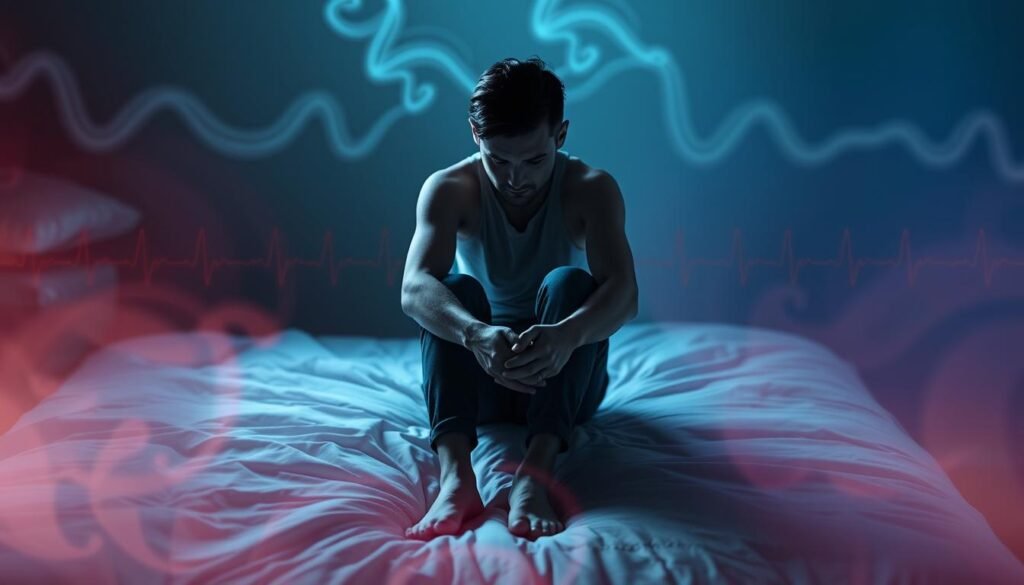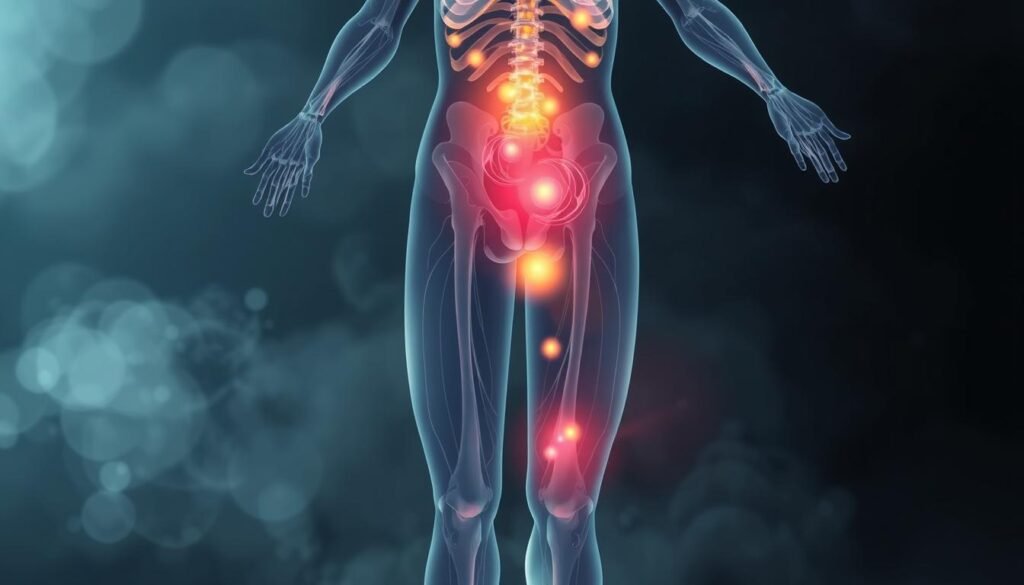Nearly 30% of adults in the U.S. might feel anxiety at times. This big number shows a less talked-about problem: anxiety’s physical effects, including numbness. Many wonder if anxiety can lead to numbness. They find out that stress can make the nervous system overreact. While it doesn’t harm nerves directly, anxiety makes the body act strangely. This can cause feelings similar to neuropathy, such as tingling and pain.
When anxiety causes numbness, it may also bring more tension and trouble breathing. These issues can make someone feel tired both in body and mind. It’s important to see the link between anxiety and numbness. This helps in handling numbness caused by anxiety. It also shows when it’s time to get help from a doctor. By addressing the main issue, anxiety, people can improve their lives. They can lessen the weird physical feelings they get.
Key Takeaways
- Anxiety affects nearly 30% of adults in the U.S., leading to physical symptoms like numbness.
- Numbness can result from hyperventilation and an overactive stress response.
- Symptoms of anxiety may mimic those of neuropathy, including tingling and pain.
- Consulting a healthcare professional is vital for addressing anxiety symptoms correctly.
- Managing anxiety through breathing techniques and distractions can alleviate numbness.
Understanding Anxiety and Its Physical Symptoms
Many people in the United States are dealing with anxiety. It shows up in different ways, with each kind having its own symptoms. Some of the main symptoms are physical. They can really change how someone feels every day. These include feeling your heart beat fast, breathing quickly, and your muscles being very tight.
When we think we’re in danger, our body gets ready to either fight or run away. This makes our heart beat faster and our blood pressure go up. Our body moves blood away from things it doesn’t think are important at that moment. Because of this, people might feel dizzy, sick, or even numb. If someone breathes too fast, they could feel their hands and feet tingle.
Feeling sick isn’t the only sign of anxiety. People can also feel really upset on the inside. This can make them worry more, which only makes things worse. One study showed that if your anxiety gets worse, you might end up with other health problems. This can include things like asthma and headaches.
It’s important to know if what you’re feeling could be because of anxiety. Knowing these signs can help you take the right steps to feel better. You might need to ask for professional help. If you want more information on how to deal with anxiety, check out the University Health Service. They have a lot of useful tips and advice.
What Is Numbness Caused by Anxiety?
Numbness from anxiety often comes as a short-term feeling. It’s usually because of how our bodies react to stress. When we feel really anxious, our nervous system kicks into gear. It makes our blood vessels tighten.
This tightening reduces blood flow to different parts of the body. It leads to feelings of anxiety-related numbness and tingles. These feelings can affect our hands, feet, legs, and face. This includes areas like the mouth and tongue too.
It’s important to know why these feelings happen. Anxiety sets off stress hormones in our bodies. Adrenaline and cortisol ready us for “fight or flight,” making us more sensitive. So, we might feel numb or tingle as our body handles stress.
While numbness with anxiety can be worrying, it’s usually not a long-term problem. But, if it keeps happening, it might mean there’s a deeper anxiety issue. If you often feel anxiety and tingling numbness, talking to a doctor can really help. They can work with you to find ways to handle it.

Knowing that numbness is due to bodily changes can ease our worries. Managing anxiety well can lessen these feelings. Trying deep breathing or mindfulness can soothe the stress response and decrease numbness from anxiety.
| Physical Symptoms of Anxiety | Description |
|---|---|
| Numbness and Tingling | Commonly experienced during anxiety episodes, often affecting extremities and face. |
| Changes in Blood Pressure | May fluctuate due to the stress response, impacting overall physical well-being. |
| Muscle Tension | Increased tension can lead to discomfort and exacerbate feelings of numbness. |
| Irregular Heartbeat | Can accompany anxiety, often worsening the perception of physical symptoms. |
| Rapid Breathing | Hyperventilation can exacerbate feelings of dizziness and tingling. |
Signs of Numbness from Anxiety
Many people feel physical numbness when they’re anxious. This feeling might feel like tingling or like pins sticking in you. It usually happens in your fingers, toes, hands, and feet. When someone has an anxiety attack, this numbness, called anxiety attack numbness, gets worse. It can make them feel more upset and notice their discomfort more. Knowing these signs of anxiety numbness helps us understand how anxiety affects the body.
Hyperventilation often happens with anxiety and leads to numbness. This is because it changes oxygen levels in the body. So, people might feel numbness in their face and hands or feet. Emotional numbness also occurs when someone is very stressed or has been through trauma. They might start to feel less emotionally, which makes them feel disconnected from what’s happening around them.
Stress and anxiety attacks can make people feel numb. They also feel other anxiety symptoms like a fast heartbeat and tight muscles. This anxiety can get worse, leading to more numbness and fear. It’s important to understand this link to find good ways to deal with it.
Noticing signs of anxiety numbness is a big step in handling anxiety. Things like deep breathing, laughing, and working out can help. Looking into treatment options for anxiety-induced numbness adds extra support. This ensures people address their symptoms head-on.
| Type of Numbness | Common Affected Areas | Associated Anxiety Symptoms |
|---|---|---|
| Physical Numbness | Fingers, toes, hands, feet, face | Tingling sensations, hyperventilation |
| Emotional Numbness | General emotional state | Depression, severe stress, anhedonia |
| Anxiety Attack Numbness | Extremities, face | Panic, rapid heartbeat, muscular tension |
Can Anxiety Cause Numbness?
Do you wonder if anxiety can make you feel numb? It sure can. When we get anxious, our body reacts in many ways. One reaction is feeling numb or a tingling sense. This usually happens in our hands, feet, and face.
How Anxiety Triggers Numbness
When we feel anxious, our body gets ready as if there’s a danger. This is called the fight-or-flight response. But this can make some unwanted changes too. For example, it can make less blood go to our hands and feet. That’s why we might feel our fingers, toes, or face go numb or tingle.
The Body’s Stress Response and Numbness
Anxiety doesn’t just change how blood flows. It can also make us breathe fast. Fast breathing can make the numbness worse. It’s hard to figure out why we feel this way. But, we can learn ways to feel better. Doing things like mindfulness or deep breaths can help. To feel in control again, it’s important to learn about anxiety numbness and what causes it.

Common Areas Affected by Anxiety-Induced Numbness
Anxiety can show up in many ways and cause different physical feelings. Numbness and tingling are common, especially in certain body parts. It’s important to know where anxiety numbness happens. This helps us understand how anxiety impacts our nervous system.
Hands and Feet
Many people with anxiety feel numbness in their hands and feet. This often feels like they “fell asleep.” It can happen because anxiety makes them hyperventilate. This lowers blood flow, causing numbness. Muscle tension from anxiety can also make this worse. It can be hard to feel normal when your hands or feet feel off.
Facial Numbness and Tingling
Anxiety can make your face feel numb too. People often feel this around their mouth and jaw when stressed. Anxiety increases nerve sensitivity. This can feel like nerve damage. Knowing about these symptoms can make anxiety worse. But it’s key for those with anxiety to recognize these physical signs.

| Body Area | Sensation Experienced | Common Triggers |
|---|---|---|
| Hands and Feet | Numbness, Tingling | Hyperventilation, Muscle Tension |
| Face | Numbness Around Mouth, Facial Tingling | Heightened Nerve Sensitivity |
Knowing these patterns helps us understand anxiety’s impact on our body. It also shows us ways to deal with it. Recognizing these feelings can help people manage their anxiety better. This can make the symptoms less frequent and severe.
How Long Does Numbness from Anxiety Last?
The duration of anxiety numbness varies from person to person. It can last a few minutes to 30 minutes. In more severe cases, it might last for several hours. Knowing the anxiety symptoms timeline helps people understand these feelings are usually brief.
Many factors influence how long numbness from anxiety lasts. These include how severe the anxiety is, how often numbness happens, and how well someone handles stress. Also, certain triggers can prolong numbness. These are hormonal changes, too much breathing leading to blood pH shifts, and muscle tension pressing on nerves.
Thankfully, numbness from anxiety is often temporary. It usually gets better when the anxiety lessens. Knowing it’s a common symptom can offer comfort. It also lessens worries about lasting health problems.
Effective Solutions for Managing Anxiety Numbness
To manage anxiety numbness well, combine coping tools with knowing when to get expert help. Using good methods can greatly boost one’s ability to handle anxiety. This reduces the numb feeling and other physical signs.
Coping Strategies
There are many ways to deal with anxiety that can lessen numbness. Here are some helpful strategies:
- Grounding Exercises: Use grounding methods to keep your mind in the present. This lowers anxiety.
- Deep Breathing Techniques: Deep breathing can manage over-breathing, which often causes numbness.
- Mindfulness Practices: Adding mindfulness to daily life can make you more aware of your body. It helps balance emotions.
- Physical Activity: Exercising regularly improves blood flow and fights numbness caused by anxiety.
It’s key to track symptoms and spot patterns in handling anxiety numbness. If numbness stays or gets worse, it’s time to look for anxiety help.
When to Seek Professional Help
Knowing when you need expert treatment for anxiety is important for getting better. You should see a healthcare professional if:
- Numbness remains after trying coping methods.
- The symptoms get worse or happen more often.
- Starting new drugs triggers physical sensations.
- Numbness comes with other worrying signs like dizziness or muscle weakness.
Professional anxiety care may include therapy, medicine, or both. These options tackle anxiety causes directly. By acting early, you can greatly better your life quality and lessen anxiety’s impact on everyday tasks.
| Strategy | Purpose | Benefits |
|---|---|---|
| Grounding Exercises | Reduce anxiety and promote awareness | Helps stay present and increases comfort with bodily sensations |
| Deep Breathing | Control hyperventilation | Decreases panic and restores calm |
| Mindfulness | Enhance emotional regulation | Improves overall mental well-being and can alleviate emotional numbness |
| Physical Activity | Boost blood circulation | Reduces physical symptoms of anxiety and enhances mood |
Conclusion
Anxiety can make different parts of your body feel numb. This includes a tingly feeling or feeling like you have pins and needles. It’s important to know that these feelings can really affect your daily life and happiness. Figuring out that anxiety causes these symptoms is a key first step in dealing with them.
Sometimes, numbness is caused by anxiety, but other times it could be from a health issue. It’s necessary to tell the difference. This might mean going for tests to find out exactly why you’re feeling numb. If you often feel numb and it worries you, you should talk to a doctor to get the right help.
Dealing with anxiety and its symptoms is totally possible. It might involve learning new ways to handle stress, getting support from friends or professionals, or both. Knowing how to manage your anxiety means you can have a more enjoyable life, even with its ups and downs.